Proven Job Search Tips: Easy Steps to Find Your Dream Job Fast
The job market is competitive and even more so this year.
If you’ve been job searching for a while now, whether as a recent graduate or an experienced professional, it seems as though you’re just unlucky.
Maybe around that same time, you’re seeking a job, and you see your peers bagging a new job and posting the good news on their social media. Then you start feeling like a loser or a very unlucky fellow.
Well, we’re here to tell you that you’re not imagining things, and you are not unlucky.
Looking for a job in today’s market is not easy. The job search process can be frustrating and challenging.
You may apply for hundreds of jobs without any success. This is the sad truth and harsh reality of the labor market.
Fortunately, you can turn the tide in your favor and control the narrative. The job hunt doesn’t need to be so scary and daunting all the time.
You need an effective job search strategy and a good understanding of the nuances involved in job hunting and interviews.
You don’t have to give up and stop searching. That won’t do you any good.
This article offers 12 job search tips and strategies to help you find and get the best job opportunities.

12 Job Searching Tips That Work: Get More Job Interviews
You have seen the perfect job advertised in job listings. You have the skills, expertise, experience, and qualifications. But how do you ensure success and get an interview?
Here are 12 simple and easy job search tips for a successful job hunt.
Assess Your Career Goals
Before following up on job leads, you must assess and define your career goals. This involves a deep level of introspection. You cannot freestyle your career life; you want tangible results.
So, when looking for a job, you must think strategically. It’s not easy, but it is (nevertheless) doable.
To make things easier, start by creating a list of your strengths, weaknesses, and marketable skills. Then, narrow it down to what you genuinely are interested in, the companies you would like to work with, and the work environment you can thrive in.
Reflect on what milestones you want to achieve in your career. For example, in 2 to 5 to 10 years, do you see yourself as a marketing, sales, or tech professional, or want to be in a managerial or leadership position?
Are there new skills you need to acquire, or do you need to fine-tune the ones you already have?
Assess all of these things and put them in writing. This will help you stay organized and find the right job.

Research The Job Market
A common mistake you make during your job search is diving in without a proper job market audit.
Yes, this advice sounds plain and cliché, so it is usually overlooked. However, in your job search journey, research is your best friend. The job-hunting process is tedious enough, and researching will make things easier.
Keep an eye on industries or companies, positions, and job requirements. Investigate industry trends, salary expectations, skills currently in demand, and what employers want from people in your profession.
Go through industry reports using platforms like Indeed, Glassdoor, or LinkedIn.
Research gives you valuable insights on tailoring your application and the arms you need for the fight.
Further Reading
Danger of NOT reading the job description
Research The Companies You Have An Interest In
You may fail at your job search because you do not know much about the companies you want to work with. Researching the company is one aspect of the job search that most job seekers neglect.
This is because you apply for numerous jobs without the time to care about knowing the company. So what do you do? You machine gun and hope that one of your bullets hits the mark.
Sometimes, it may work, but leading with this mindset will only set you up for ruin and cause you to miss out on fantastic job opportunities.
Recruiters expect you to have the decency (and common sense) to know something about the company. When you do your due diligence about the company (or companies) you want to work with, it tells the employer that you are highly motivated to work for them, more than just being interested in a paycheck.
So, before hitting the “Apply” button, carve out some time to do your homework and familiarize yourself with the industry/company.
But how do you do this? Where do you start?
It’s super easy! First of all…
- Search background information: You can get such info by combing through the company’s website or social media pages. Read their About page and take note of their history, mission, vision statement, achievements, company culture, and organizational values. Will you enjoy being a part of the company? Who is the hiring manager in that company?
- Check their products/services: Find out what they sell and the services they offer. Also, scan for positive reviews by customers online about their products/services. If you have used their products or had experience with their services, you can mention it in your cover letter or during an interview.
- Read the job description: You must know the requirements for job openings or positions in that company. Do you have the required work experience and qualifications? Does your resume or CV reflect this?
- Investigate the salary range: What is the company’s salary range for the role? Are you comfortable with it? Would you like to negotiate the salary? Also, investigate the average salary range for similar or the same positions via Indeed or Glassdoor.

Upgrade and Tailor your CV or Resume, and Cover Letter
Writing a brilliant, attention-grabbing CV, resume, and cover letter will increase your chances of getting hired.
However, the wrong approach is to create a single resume, CV, or cover letter and use it to apply for many job openings or positions.
Your resume, CV, and covering letter must match each other and the job description. Recruiters will appreciate the effort.
Customizing your CV, resume, and covering letter for different job postings can be grueling. It is easier and more convenient to have a single resume, CV, or covering letter and use it for every application.
We understand.
However, this isn’t how the job search journey works. You must tailor your CV, resume, and covering letter to each position you apply for.
Take the time to tweak them by updating your professional skills and work experience section.
To upgrade your resume and CV, we recommend the following steps:
- Conduct a content audit and remove whatever is outdated or irrelevant.
- Conduct keyword research and organically put keywords in your resume.
- Add weight to your achievements by quantifying them where possible.
- Make your resume or CV readable.
- Proofread.
It may seem punishing, but it might be time to get a new resume or CV if you haven’t done any of these things. Why? Because you won’t be applying for only one job role.
For example, if you are a management professional, you might apply for HR, manager, project manager, or other managerial positions.
A good covering letter should look like this;


You can access our 25 free downloadable covering letter examples.
On the matter of your resume or CV formatting, a professional format should look like this;

CareerVidz shows how to write a CV in this video:
Related Post
How to Write a CV Work Experience
Prepare For The Interview Process
This is the least enjoyable (if not disliked) part of job searching. Nobody loves being interviewed, so we understand why you get the jitters.
Nevertheless, you can conquer that fear by knowing what to expect in an interview. When you sharpen your interview skills (through practice), interviews can become manageable.
So, what interview tips can you use? You should…
-
Students can schedule informational interviews with career experts, a career coach, friends, or family members. They can also schedule mock interviews with university or college staff members.
-
Rehearse common interview questions.
-
Practice your lines and responses.
-
Stay organized.
-
Mind your body language.
-
Compile a concise list of your skills, strengths, and weaknesses.
-
Read and understand the job description.
-
Prepare your clothes or tech equipment (for virtual interviews) beforehand.
-
Go easy on the double-latte so you don’t get too jittery and anxious.
-
Succinctly relate your skills, achievements, strengths, and weaknesses to the role.
-
Ask questions.
-
Be courteous.
-
Keep it professional.
During an interview, the interviewer will test you with open-ended questions. If you’re not prepared for it, it can hit like a rock and leave you stuttering or unable to collect your thoughts.
Examples of such interview questions you should prepare for include:
Remember, the interviewer is not your enemy or someone to be afraid of. Strive to impress the interviewer.
If the interviewer asks you any problematic questions, relax (but don’t delay), collect your thoughts, and then respond.
Networking Is Your Best Friend
Networking is a very effective job search strategy. Networking lets you meet many great people, career experts, professionals, and even hiring managers. These people can help you climb the career ladder more quickly.
When you network, you build connections with people who can give you sound career advice or hire you. You might even find a mentor.
The more you network with people (letting them know you are looking for a job), the higher the chances of gaining referrals. Or you may learn about openings (that may or may not be advertised) in the process.
Although everybody wants to be great at networking, only a few people know how to do it properly.
Networking involves charm and charisma, both of which require a certain level of confidence. Networking needs skill.
Fortunately, there are specific ways and certain things you can do to become a networking guru.
-
Know your potential customer or partner.
-
Attend networking events. Attend as many as possible.
-
Attend job fairs and connect with potential employers.
-
Leverage your college professors. They are more well-connected than you think and might be instrumental in helping you land a job.
-
Contact your college or university alumni network for job leads. They may be willing to offer guidance, support, and job search advice.
-
Build a solid reputation as a professional.
-
Be charming but not obnoxious.
-
Create small talk about current (relevant) events.
-
Sharpen your listening skills.
-
Don’t ask for favors too early. It’s ugly and a little bit offensive. Networking is a relationship kind of thing and not a one-night stand.
-
Be positive in person, over the phone, or via email.
-
Build a solid brand online. No one wants to network with a ghost.
-
Be yourself. Trying to be someone, you do not come across as very awkward.
-
Artfully brag about yourself without bragging about yourself. Talk about some of your achievements without coming off as cocky or arrogant.
Related Post
Secrets for Writing a CV That Gets You Interviews

Update and Maintain Your Social Media And Digital Presence
Not building a presence online is a dangerous mistake many job seekers make in their job search. Companies browse your social media accounts, and if they like what they see, they will hire you.
That is why you often see a company asking for your LinkedIn profile or relevant social media handles during an interview or application.
However, it’s one thing to have opened an online account. Anybody can do that. But what does your online presence say about you? Is it speaking your language?
You must craft your digital or online presence to present yourself as the ideal person for a job and make yourself stand out from other candidates.
This means that you must continuously update and craft your reputation online with an artist’s care.
How can you do this?
Tailor your online profile with specific keywords employers look for when searching for candidates in your field.
You can obtain such keywords by searching for open positions in your field (or industry) and selecting the keywords of those companies.
Also, you can develop a personal website as a writer, software designer, or web developer. Use this website to discuss and showcase your work and knowledge in your area of expertise.
Your online profile is critical to job hunting because it gives employers something to see and a reason to employ you. Remember, no company wants to hire a ghost as an employee.
Be Ready to Negotiate Salary
This is the primary factor that makes you stay motivated to work. When you are eventually offered a new job, do not hesitate to negotiate your salary and compensation package.
You can do this during an interview (when asked) or through email.
Many job applicants are afraid to negotiate their salaries and will settle for the supposed competitive salary that the company claims to offer. You should not do this.
Do not feel shy or scared to negotiate your salary. Negotiating your salary and compensation will impact your career trajectory for the better.
Here are a few guidelines on how to negotiate your salary;
-
Research industry salaries for your field
-
Know your market value and demonstrate it effectively to the company.
-
Bid a high salary range
-
Don’t overlook other benefits and compensations
-
Understand constraints and non-negotiables
-
Be confident but courteous

Be Intentional and Rational
Job search is a delicate process, and you must be intentional with what you do.
Although many jobs exist, spraying your application and hoping for the best will not help you. It is impractical and unlikely to get you employed.
When you machine-gun, you will probably apply for jobs you are not qualified for or fail to tailor your application to the company and job position. Ultimately, this will lead to rejection.
Therefore, be intentional and rational about your job applications. Stop freestyling.
When applying for jobs, we recommend that you:
-
Leverage online resources like a job board or job search websites like LinkedIn or Indeed.
-
Attend networking events to network with career experts or even potential employers.
-
Apply for jobs that you are qualified for and interested in. For example, if you’re an intermediate content writer with 3 years of experience, you won’t get the role of a senior editor.
-
Focus on the job’s requirements and ensure you meet most or all of them.
-
Gain helpful contacts through volunteering, internships, or participating in job fairs.
-
Establish meaningful connections.
-
Apply for jobs as frequently as possible. The job search is a process, not something you do daily. So, give yourself at least five months of consistent attempts.
-
Have a mentor to offer you guidance and job search advice.
Like this post?
Sign up for our blog updates and never miss a post.
We’ll send you A FREE job interview eBook as a thank-you.
It May Be Time To Upskill in Your Career Journey
The job market constantly changes, and successful applicants adapt by learning a skill. If you want to stay ahead of the game in your job search, you must have an undying commitment to learning.
Learning a new skill relevant to your field or industry boosts your confidence and hiring potential. Employers love to see someone dexterous and capable of doing many things.
You can upskill by:
-
Taking online courses.
-
Attending workshops, boot camps, and professional development programs offered by industry associations.
-
Applying for internships.
-
Surround yourself with professionals in that field who will provide insight.
Most importantly, have people who support you.
Having other skills on your resume will show employers you are concerned about your personal and professional development.

Go Offline: Use Word Of Mouth
Online job search may be the most popular way of finding jobs, but it is not the only way. You can switch to the old-fashioned way of talking to people and spreading the gospel of what you can do.
Believe it or not, job applications can be achieved through word-of-mouth. It might be an oldie, but it is still a goldie.
Reach out to people in your professional network and ask if they know any companies or recruiters currently hiring for your role.
When you attend events or job programs, start conversations with people and tell them what you can do. They may know someone who knows someone.
No matter what, make a good first impression to be more memorable to the people you meet. They will remember you and refer you when they see an opportunity.
Identify organizations you are interested in and send a cold email. You can even connect with people who work there via social media or LinkedIn and ask about openings.
Don’t limit yourself to online resources alone. Human interaction is still a great resource.
Follow Up
Sending a follow-up message after an interview is very important in your job search. It shows how interested and serious you are about the job.
Unfortunately, many overlook this part and immediately start firing more applications.
A follow-up message doesn’t guarantee you getting hired or employed. However, you should follow up on your application to see whether you get the job.
Nevertheless, you don’t want to follow up after an interview or application without being pushy. Here’s how you can follow up on your job applications:
-
Please read the job listing and identify the application closing date. Do not send a follow-up message before that date.
-
The recruiter or employer usually provides a timeframe. If none was given, wait for a week before sending a message.
-
Pick the best day to send a follow-up message. Mondays are usually very busy, and if the recruiter doesn’t see your message on a Friday, it will get buried under other emails over the weekend.
-
Keep it professional. You and the recruiter are not friends, so as you reiterate your interest in the position, your tone and words must remain professional.
-
Be brief and concise with your follow-up message.
Here’s a sample follow-up message you can learn from:
Subject: Sales Executive Application Dear Ms. /Mrs. /Mr. X, I’m writing to follow up on the application I submitted on the 7th of July for the Sales Executive position as advertised. I am interested in working with X company and would love to speak with the hiring team about this position. In the Aspo Project, I mentioned during the interview that I took the initiative early on. Anticipating upcoming hurdles, I crafted and executed strategies that notably boosted our team's productivity and the success of our projects. Driven by well-defined, quantifiable objectives, my commitment met and exceeded our quarterly benchmarks by X%, highlighting my focus on results. Employing communication centered around our goals, I successfully united team actions and cultivated a cooperative atmosphere, ensuring each member was actively involved and motivated to achieve our shared goals. These are the skills needed for the role. I also have X years of experience in sales and marketing, and I look forward to assisting the sales team in their endeavors. Thank you once again for taking the time to review and consider my application. I look forward to hearing from you! Yours faithfully, [Your Name]

Bonus Job Search Advice
Whether fresh out of college, unemployed, or looking to advance in your career, you must not compromise on these quick job search tips.
Use Job Search Websites
There are so many job search websites and job boards that you can use to find jobs. You need to pick the one to concentrate on. Popular job boards include:
-
Indeed
-
LinkedIn
-
Monster
-
Flex Jobs
-
TheMuse
Job search websites and job boards make job search activities more manageable by providing job listings. They allow you to create and receive notifications about your preferred job alerts.
You can also create a resume on job boards or websites and upload your (personal) resume, which is automatically shared when you apply for jobs.
Study The Job Description And Assess The Essential Requirements
Ensure you study the job description and essential requirements before sending an application. Recruiters won’t select you if you do not meet the core job requirements.
You don’t have to meet 100 percent of them. You should not apply for a job unless you meet at least 60-70 percent of the candidate’s profile.
If you meet the requirements, refer to the specific skills and qualities the employer is looking for in your application.
Address each skill one by one in your “Supporting Statement” document.

Use LinkedIn to Your Benefit
You’re missing out on many opportunities if you don’t have a LinkedIn profile.
LinkedIn has a lot of benefits for job seekers and students looking for internships. With LinkedIn:
- You can create and keep in touch with your network of professionals.
- You can connect with career experts to get access to their LinkedIn job search tips.
- Create a well-optimized LinkedIn profile that will attract hiring managers to offer you a job.
- You can follow the company you are interested in, make friends with people who work there, and get to know yourself better over coffee.
- You can connect with people you knew in college and ask them for referrals.
- You can make new acquaintances or have a mentor to teach you and give you job search advice.
Jeff Su reveals 5 MUST-KNOW LinkedIn profile hacks for job seekers in 8 minutes:
Be Flexible
The job market is changing quickly, and you must be flexible to adapt. Explore other roles that can use your skills and invest in soft skills like communication or teamwork.
Besides, you don’t always need to land a full-time job. Explore freelance or part-time opportunities to experience a work-life balance.
Own your story
When you write your CV or resume, tell your story in your way. Be brief and precise. It will help add value to your resume.
To succeed, you need to tell a unique story that grabs the attention of recruiters.

Dos And Don’ts
You will encounter various challenges during your job search. However, with the right approach, you can increase your chances of finding the right job.
Here are some dos and don’ts you should know before embarking on your job search process:
Dos
- Edit all documents. Spell-check all the documents (resume, CV, and covering letter) in your job application, so they are error-free. You can use free apps such as Grammarly or Hemingway to check the readability of your documents. They’ll suggest what to improve.
- Use power verbs. When you write your resume, CV, and covering letter, focus on using the active voice and avoiding the passive voice (e.g., transformed, delivered).
- Instead of just stating your responsibilities in your resume or CV, demonstrate what you can do for the hiring manager.
- Get a second or third opinion. Two heads are better than one! So, get other opinions about your job application. Ask someone to read through your cover letter and CV. Preferably from someone in the industry.
Don'ts
- Never send your CV without a cover letter: Include a cover letter in your job application. The exception is if the company advertising the position instructs you not to send one. You should always send these two documents as part of your job search.
- Don't give bad reviews about your previous employers or coworkers.
- Prepare for interviews and always practice your responses to complex questions.
- Don’t forget to contact your previous employers or personal references. Some companies call them, and they can be valuable resources for you. Your breakthrough might depend on what they say about you.
- Never sell yourself short! Employers want to hire you. That’s their JOB! But you can make their job easier by presenting yourself as an asset.
Thriving Job Trends
Tech: If you’re into tech, fields like cybersecurity, data science, artificial intelligence, digital marketing, and software engineering will put you in high demand.
Healthcare: With an aging population, mentally challenged individuals, and people with special needs, professionals in the healthcare industry are in demand.
Remote Work and Flexible Employment: Remote work and flexible employment will become more mainstream. Roles like virtual assistants, remote coordinators, and freelancers will become the norm.
Green Energy and Sustainability: As many industries focus on environmental sustainability and renewable energy, careers like renewable energy engineers, urban agriculturalists, renewable energy installers, and climate data analysts have experienced an upward trajectory.
Own Your Job Search Journey
Job search has its highs and lows, and the path to career success is rarely a straight line.
You will encounter frustrating twists and turns along the way. However, nothing good comes easily.
You should embrace your journey and see every setback as a stepping stone to self-discovery and greater heights.
This post has outlined strategies to hack your job search and land a perfect job.
From polishing your resume to networking with career experts, you are on your way to winning the hearts of recruiters and finding your dream job.
So, do not get discouraged or give up on your job search. Remain steadfast in your pursuit of determination in your career future.
Own your journey and enter the job search with your newfound knowledge.
Your dream job is just at your fingertips, and you can catch it if you unlock your potential.
So, fight the good fight and fight to win.
Cheers!
Do you have any job search tips?
Please share them with other job seekers in the comments below.
Related Article: Job Search Tips
- Best Interview Tip: Start Onboarding Before You Get the Job
- 25 Best Career Websites



